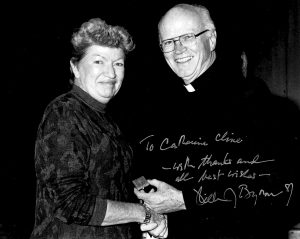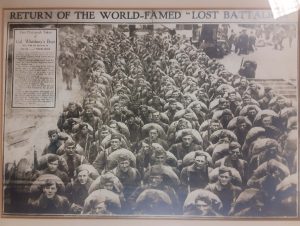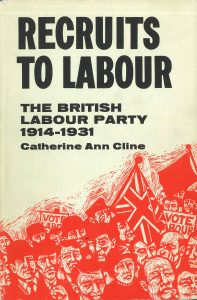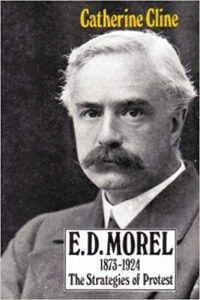
March is Women’s History Month, so why not celebrate a pioneering woman who was an historian: Catherine Ann Cline, distinguished scholar of Great Britain in the twentieth century and former chair of the History Department at The Catholic University of America in Washington, D.C. She was especially interested in the rise of the British Labour Party and the roots of the British appeasement of Fascism in the wake of the controversial Treaty of Versailles that ended the First World War. Cline was also a gifted teacher of erudition who mentored many students as well as being a lover of the arts. Her archival papers are among those of many notable History department faculty along with those from other disciplines at Catholic University housed in Special Collections.

Cline was born on July 27, 1927 in West Springfield, Massachusetts, to Daniel E. Cline and Agnes Howard. She earned a B.A. from Smith College in 1948, an M.A. from Columbia University in 1950, and a Ph.D. from Bryn Mawr College, where she worked with Felix Gilbert. She taught at a number of universities between 1953 and 1968: Smith College, St. Mary’s College of Indiana, and Notre Dame College of Staten Island. In 1968, Cline became an associate professor of history at Catholic University and rose to full Professor in 1974. She served as Chair of the History Department from 1973 to 1976 and again from 1979 to 1982. Noted for her integrity, and in recognition of her long service to Catholic U she was awarded the Papal Benemerenti Medal on April 10, 1995, Catholic U’s Founders Day. She continued teaching at CUA until her death in 2006 after a long illness.

Cline was an expert in modern British history, especially the early twentieth century and the rise of the Labour Party. She was the author of the book Recruits to Labour: The British Labour Party, 1914-1931 (1963). It was an innovative prosopography of nearly seventy political converts in the era of the First World War who reshaped Labour’s domestic and foreign policy in the postwar environment. Cline’s second book, E. D. Morel, 1873–1924, The Strategies of Protest (1981), is an authoritative political biography of an outspoken reformer who demanded democratic control over British diplomacy. He was jailed during the war by the British government for his anti-war activism.[1] Morel is also notable for defeating Winston Churchill in the 1922 Parliamentary election, taking Churchill’s Scottish seat in Dundee and effectively knocking Churchill out of the Liberal Party. Churchill only found has way back into Parliament later as a Conservative.

Cline’s third area of research, published in articles in The Journal of Modern History and Albion and presented in papers at scholarly conferences, examined British public opinion and the Treaty of Versailles. Seeking the roots of British appeasement, she uncovered ways that British elites promoted a negative view of the peace treaty and their impact on interwar diplomacy. She also wrote numerous articles and book reviews for the American Historical Review, Catholic Historical Review, and Church History. Additionally, she was a research fellow of the American Philosophical Society and a member of the Faculty Seminar on African History at Columbia University as well as a member of the American Historical Association, the American Catholic Historical Association, and the Conference Group on British Studies. She served on several prize committees of these organizations.[2]
Her former colleague and distinguished professor of British history in his own right, Dr. Lawrence Poos, described Cline as:
“Cathy Cline was instrumental in my being hired as a faculty member in the History Department, and what I remember of my first impression of her is what remained throughout her career here and after her retirement: personally and professionally she was gracious, in an old school sense (and I mean that as a most sincere compliment). Even when she was strongly opposed to something, she would find the right occasion to make her opinions clear in the proper setting. She was also famous for the New Year’s breakfast (really, brunch) she hosted in her apartment each year, in homage (so we always understood) to the famous salon-style breakfasts and conversations of Victorian Prime Minister William Gladstone.”[3]
In conclusion, while I only met her briefly a few times on campus, I was most impressed by her first published work, before she emerged as a scholar of modern Britain, which was an excellent 1952 article [4] on the coal fields of eastern Pennsylvania, a subject near and dear to my heart. It always struck me that the gain to British labour history was a loss to American labor history!
[1] Carole Fink, February 1, 2006. American Historical Association web site- https://www.historians.org/publications-and-directories/perspectives-on-history/february-2006/in-memoriam-catherine-ann-cline
[2] Ibid.
[3] Poos to Shepherd, email, March 3, 2020.
[4] Cline, Catherine Ann. ‘Priest in the Coal Fields, The Story of Father Curran,’ Records of the American Catholic Historical Society of Philadelphia, Vol. 63, No. 2 (June 1952), pp. 67-84.
